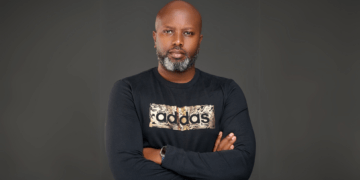Last year, there was quite a bit of talk around Kenya’s entry to the 2023 Oscars in the Best International Feature Film Award category, both good and bad. The film at the centre of this debate was Terastorm, the animated superhero film written and directed by Andrew Kaggia who’s also its sole animator. Kaggia, a talented animator, has been on the scene for over a decade, producing, among others, an exciting short film available on YouTube called Wageuzi (think Transformers meets Kenyan politics), as well as one of the most watched animated superhero battles on Kenyan YouTube between Superman, Batman, Deadpool, Hulk, Goku, and a score of others, under the handle HeroSmashers.
Terastorm follows a group of elite African heroes who unite in an attempt to vanquish an ancient wizard threatening to destroy the earth with a powerful mysterious artefact. According to the Oscars website, foreign films must be ‘theatrically exhibited outside of the United States and its territories for at least seven consecutive days in a commercial motion picture theatre for paid admission’.
Kaggia says that the process of making the film took about one and a half years, after figuring out the basic concept, script development, characters, 3D modelling, and auditioning the voice actors. “It’s harder to do in Kenya, definitely,” he adds. “There were a lot of challenges, especially to do with hardware. What I had was not sufficient for such an ambitious project in the middle of COVID-19. Had I been able to walk into a Walmart and get a graphics card, it would have been done in half the time.”
And the effort is recognized. Harto Muhato, animator and founder of Tsunami Studios, further explains that five minutes of animation takes approximately three months to deliver with a full team, and so comparatively, delivering an hour of animated content as a sole animator is no mean feat. “Nollywood became successful because Nigerians embraced and lifted their culture and stories. I advocate for fellow artists and the general public to show up and support this great achievement,” Muhato says.
Nigeria, though, despite being Africa’s biggest and busiest film industry, and with ‘strong’ contenders last year, like Biyi Bandele’s Elesin Oba, Kunle Afolayan’s Anikulapo and Femi Adebayo’s King of Thieves, chose not to submit any film to the Academy Awards, with Nigerian Oscar Selection Committee (NOSC) stating that the films submitted were not eligible to compete. It was a controversial decision that was met with much criticism, and even prompted the Academy to order a revote from NOSC which stood its ground with a “No Revote” verdict. This was the second year in a row that Nigeria failed to submit any film for Best International Feature since their first entry in 2019 with Genevieve Nnaji’s Lionheart, and Desmond Obviagele’s The Milkmaid in 2020.
Now back to Kenyan films and their place at the Oscars. Though the effort is there, it begs the question whether effort in itself is enough. This is, of course, how film industries are born; someone has to be trying to do something, anything. It’s a delicate question when you consider the quality of what Kenya has produced in our relatively nascent film industry, and what our neighbours and the rest of the world is producing – a factor that I think is only relevant simply because, with the Oscars, we are competing on a global stage, and against far more superior projects that have garnered ‘Oscar buzz’ way earlier before the race even begins.
For the sake of comparison, and to start with, let us look at Kenya’s previous entries. Our 2022 submission was Mission To Rescue which coincidentally features Melvin Alusa, who also does voice acting for Terastorm. As Kenya’s first-ever military action film, Mission To Rescue is a milestone in itself but was is really Oscar-worthy material?
There was also Wanuri Kahiu’s critically-acclaimed Rafiki (2018), Kenya’s first film to premiere at Cannes Film Festival. Rafiki was banned in Kenya by the Kenya Film and Classification Board (KFCB) for its themes on same sex marriage, a ban that was temporarily lifted by the High Court of Kenya to allow it to compete for the Oscars. In their final decision, the Kenyan Oscars Selection Committee chose Likarion Wainaina’s Supa Modo over Rafiki as Kenya’s official entry.
Even further back, Kenya’s first-ever Oscar contender was the indomitable Nairobi Half Life in 2012 – a film that is touted to this day, as one of Kenya’s best productions, in my opinion as well, for its authenticity, and its spectacular acting.
Here is where the conversation turns. Kenya has submitted seven films to the Academy so far since 2012, with no submissions only in 2013 through to 2016. However, from 2017, it would seem that Kenya has always felt the need to send a film to the Oscars, even those that simply do not stand a chance. When Kenya Film Commission (KFC) announced Terastorm as Kenya’s 2023 official entry, there were murmurs as to whether it was good enough to represent the country. Tambay Obenson, founder of Shadow and Act, who also founded Akoroko (an Africa-focused film and television platform) summed it up in a tweet: “Honestly can’t say I’m impressed by the selection though. After top-shelf entries like Kati Kati and Supa Modo in previous years, this feels like a step backward. But props on 3D CG cinema advancements.”
There are many factors to consider here, but most specifically: have all previous Kenyan entries been worthy to compete in such a prestigious global award with the world’s best or has KFC always seen it absolutely necessary to submit a film just for the sake of it? And the real question here is, what criteria are used to select these films, to see if they can actually measure up to other submissions from around the world, and more importantly, from the continent?
To cast a broader scope, let’s look at some of the films Terastorm was up against in the Best International Feature category. Tanzania’s Vuta N’Kuvute (Tug of War), a visually intense historical romantic drama based on Adam Shafi’s award-winning Swahili novel; and Algeria’s Nos Frangins (Our Brothers), directed by Rachid Bouchareb who has previously submitted seven films, and earned three nominations in 1995 for Poussières de vie (Dust of Life), in 2006 for Indigènes (Days of Glory) and in 2010 for Hors-la-loi (Outside the Law) (2010).
Read: Vuta N’Kuvute Review.
And also consider the aforementioned Nigeria, whose behemoth of an industry voted not to submit any film that year…we might be out of our depth here. Should Kenya have done the same? Because this is indeed an option for KFC and the Oscars Selection Committee Kenya (OSCK), the board that decides which film should represent the country at the global stage, which they do a callout for every year. I ask this for the simple reason that the level of quality offered by others in the same category leaves Terastorm quite far behind. The film itself has been reviewed on this very website, and I concur with the presence of possibility partnered with a lack of story and development. Does this mean that Kenyans should support Terastorm? Absolutely, it’s our film. But I would argue that it is a beginning in the revolution of an animation industry hampered by so much, as opposed to a finished ‘Oscar submission worthy’ project.
Wouldn’t it make more sense to not submit films that do not necessarily match international standards, in order to not hurt the credibility of the industry, and sit it out? Again, not to say that these local films should not be celebrated and encouraged, with viewings, infrastructure like schools, trainings, and awards such as the Kalashas to give them recognition – but not everything needs to be on a global stage immediately after production. Our Oscar Selection Committee, though perhaps acting in good faith, jumped the gun on this one.
Now as the 2024 Oscars race heats and with the submission call coming to an end, it will be interesting to see what Kenyan film this committee selects to represent us. It’s no secret that one film – Angela Wamai’s Shimoni – stands out, as our most likely (and by far, strongest) choice. Anything else, and we must seriously interrogate the role of this Oscars Selection Committee, their criteria of selection and if at all they have what it takes to make these decisions.
Enjoyed this article?
To receive the latest updates from Sinema Focus directly to your inbox, subscribe now.











